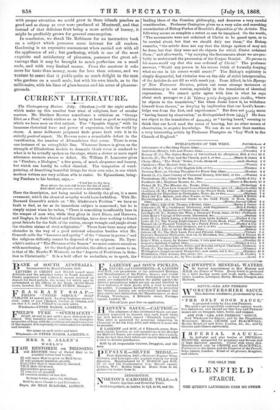CURRENT LITERATURE.
The Contemporary Review. July. (Strahan.)—Of the eight articles which make up this number four treat of religious, four of secular matters. Mr. Matthew Browne contributes a criticism on "George Eliot as a Poet," which strikes us as being at least as good as anything which we have seen on that subject. The "Spanish Gypsy," with its immense rhetorical force and power of expression, took the world by storm. A more deliberate judgment finds grave fault with it in its strictly poetical aspect. Mr. Browne notes a remarkable defect in the versification, the number of Alexandrines that occur. There is even one instance of an octosyllabic line. Whatever licence is given on the strength of Elizabethan Models to dramatic blank verse is confined to what is to be actually spoken on the stage, where a slower or more rapid utterance corrects excess or defect. Mr. William P. Lancaster gives us "Pandora, a Dialogue," a fine poem, of much eloquence and beauty, but which can hardly be called classical. The temptation of word- painting, of describing beautiful things for their own sake, is one which modern writers are very seldom able to resist. So Epimethens, bring- ing Pandora to his brother, says,— "I led her to thy face,
Here where the red cliff fronts the flat of sand, And short salt grasses cease in mountain sedge."
Here the description, not being needed to identify the place, is a mere ornament, which the classical severity would have forbidden. With Mr. Bernard Cracroft's article on "Mr. Gladstone's Position" we have no fault to find, as far as its immediate subject is concerned ; but he is simply unjust when he writes, "There is something insufferably base in the temper of men who, while they glory in their Etons, and Harrows, and Rugbys, in their Oxford and Cambridge, have done nothing to found great Schools for the bulk of the nation, except wrangle and jangle about the obsolete claims of rival religionists." There have been many other obstacles in the way of a good national education besides what Mr. Cracroft calls the "baseness and apathy" of the "classes in power ;" and the religious difficulty cannot be disposed of by an epigram. Mr. Tyrr- whitt's notice of "The Pictures of the Season" we must content ourselves with mentioning. Of the theological articles, the ablest, as it seems to us, is that of Mr. Brooke F. Westcott, on the "Aspects of Positivism in Rela- tion to Christianity." It is a bold effort to assimilate, so to speak, the leading ideas of the Comtian philosophy, and deserves a very careful consideration. Professor Conington gives us a very calm and searching examination of Bishop Forbes of Breclain's Exposition of the Articles. The following seems as complete a retort as can be imagined. On the words, "The sacraments were not ordained of Christ to be gazed upon, or to be carried about, but that we should duly use them," the Bishop remarks, "the article does not say that the things spoken of may not be done, but that they were not the objects for which Christ ordained them ;" and afterwards, "by carrying the Sacraments about we are pro- bably to understand the procession of the Corpus Domini. No person in his senses would say that this was ordained of Christ." The professor answers, "Would any person in his senses think of formally denying what no one in his senses would assert ?" The Bishop's sophistry is simply disgraceful, but victories won on the side of strict interpretation of the Articles do not fill us with much joy. Doan Alford, in his Byways- of New Testament Revision, points out some strange instances of inconsistency in our version, especially in the translation of identical expressions. We cannot quite agree with him in what he says about such passages as 1) di 'Mau; yvo:); apEA:Wpitup izaggp, where he objects to the translation," But when Jesus knew it, he withdrew himself from thence," as denying by implication that our Lord's know- ledge was from the first, and superhuman." But does not pair; mean "having learnt by observation," as distinguished from isoc4 He does not object to the translation of cbt000-c4 as "having heard," seeming to think that our Lord used the sense of bearing, but no other means of observation, to acquire knowledge. We can do no more than mention a very interesting article by Professor Plumptre on "Lay Work in the Church of England."






























 Previous page
Previous page